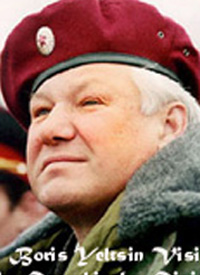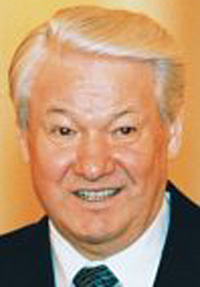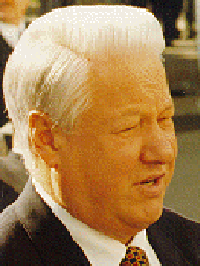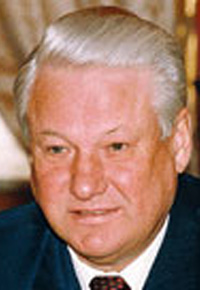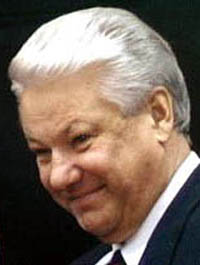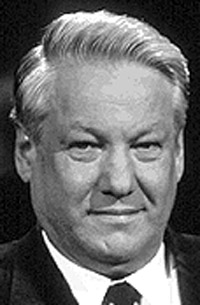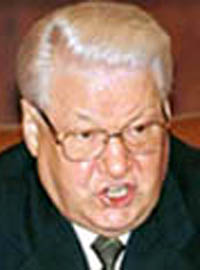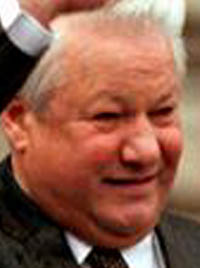Copyright Michael D. Robbins 2005
Astro-Rayological
Interpretation & Charts
Quotes
Biography
Images and Physiognomic Interpretation
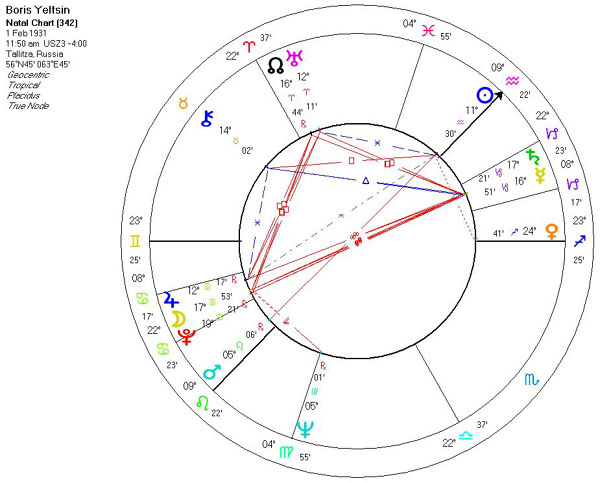
It is especially important to encourage unorthodox thinking when the situation is critical: At such moments every new word and fresh thought is more precious than gold. Indeed, people must not be deprived of the right to think their own thoughts.
Boris YeltsinLet's not talk about Communism. Communism was just and idea, just pie in the sky.
Oh, where is the poet or bard who will compose an ode to Russian rumours? Thanks to the chronic shortage of truthful (or even false) information, our people live on rumours.
There are numerous bugbears in the profession of a politician. First, ordinary life suffers. Second, there are many temptations to ruin you and those around you. And I suppose third, and this is rarely discussed, people at the top generally have no friends.
Today is the last day of an era past.
While maintaining our nuclear potential at the proper level, we need to devote more attention to developing the entire range of means of information warfare.
You can make a throne of bayonets, but you can't sit on it for long.
Boris Yeltsin was born to a peasant family in Butka village, Talitsa district, Sverdlovsk region. His father, Nikolai Yeltsin, was convicted of anti-Soviet agitation in 1934 and served in a gulag for three years. After his release he remained unemployed for a while and then worked in construction. His mother, Klavdiya Vasilyevna Yeltsina, worked as a seamstress.
Yeltsin studied at Pushkin High School in Berezniki, Perm region. He studied well, and during the whole stay at school he was the class leader (????????). However, he had problems with discipline. He participated in street fights and he was constantly in conflict with someone: teachers at school, his father. In these conflicts he often came out a winner. Thus, when his 7-year education attestation was revoked, he demanded that a committee was formed to invistigate this case and eventually had the attestation given back to him and the teacher responsible for revokation fired. He passed the 10-year education exams without taking the full course. He was fond of sports: skiing, gymnastics, volleyball, track and field, boxing, wrestling, despite losing two fingers in a childhood accident (said to have been the result of playing with a live grenade).
Yeltsin received higher education at the Ural Polytechnic Institute in Sverdlovsk, majoring in construction, and graduated in 1955. The theme of his degree paper was "Television Tower."
In 1955-1957 he worked as a foreman at the building trust Uraltyazhtrubstroi. In 1957-1963 he worked in Sverdlovsk,and he was promoted from construction site superintendent to chief of the Construction Directorate with the Yuzhgorstroi Trust. In 1963 he became chief engineer, and in 1965, head of the Sverdlovsk House-Building Combine. He joined the ranks of CPSU nomenclatura in 1968 when he was appointed head of construction with the Sverdlovsk Regional Party Committee. In 1975, he became secretary of the regional committee in charge of the region's industrial development.
CPSU member
Member of the Communist Party of the Soviet Union (CPSU) from 1961 to July 1990, he began working in the Communist administration in 1968. He later commented on his communist views:
"I sincerely believed in the ideals of justice propagated by the party, and just as sincerely joined the party, made a thorough study of the charter, the program and the classics re-reading the works of Lenin, Marx and Engels."
In 1977 as party boss in Sverdlovsk, he ordered the destruction of the Ipatiev House where the last Tsar had been murdered. The Ipatiev House was demolished at night time on September 17-18, 1977. In addition, during Yeltsin's stay in Sverdlovsk, a CPSU palace was built which was named "White Tooth" by the residents. During the 30 years of his activities as a communist, Yeltsin developed connections with key people in the Soviet power structure.
Appointed to the Politburo , Yeltsin was also "Mayor" of Moscow (First Secretary of the CPSU Moscow City Committee) from December 24, 1985 to 1987. He was promoted to these high-rank positions by Mikhail Gorbachev and Yegor Ligachev who presumed that Yeltsin would be "their man". In addition, Yeltsin was given the country house (dacha) which was previously occupied by Gorbachev. During this period, Yeltsin portrayed himself as a reformer and populist (for example, he took a trolleybus to work) and fired and reshuffled his staff several times. His initiatives became popular among Moscow residents.
In 1987, after a confrontation with hardliner Yegor Ligachev and eventually with Mikhail Gorbachev, Yeltsin was sacked from his high-ranked party positions. On October 21, 1987, without prior approval by Gorbachev, Yeltsin, at the plenary meeting of the Central Commitee of the CPSU lashed out at the Politburo expressing his discontent with the slow pace of reform in society and servility shown to the General Secretary and asked to resign from the Politburo adding that the City Committee would decide whether he should resign from the post of first secretary of the Moscow City Party Committee. In his reply, Gorbachev accused Yeltsin of "political immaturity" and "absolute irresponsibility," and raised the question of relieving Yeltsin of his post of first secretary at the plenary meeting of the Moscow City Party Committee. Nobody backed Yeltsin. Criticism of Yeltsin continued on November 11, 1987 at the meeting of the Moscow party committee. He admitted that his speech had been a mistake. Yeltsin was fired from the post of first secretary of the Moscow City Committee. He was not exiled or imprisoned as once would have been the consequence, but demoted to the position of First Deputy Commissioner for the State Committee for Construction. After being fired, Yeltsin was hospitalized and reportedly (which was confirmed by Nikolai Ryzhkov) attempted a suicide. Yeltsin was perturbed and humiliated but then plotted his revenge. He recovered, and started intensively criticizing Gorbachev using the slow pace of reform in the USSR as the major argument.
Yeltsin's criticism of the politburo and Gorbachev led to a smear campaign against him. The organizers of the smear campaign apparently thought that it would be an easy job to get rid of Yeltsin using examples of his awkward behavior. An article published in Pravda described him as being drunk at a lecture during his visit to the United States, and a TV account of his speech seemed to confirm this information. However, the popular dissatisfaction with the regime was very strong, and any attempt to smear Yeltsin only added to his popularity. Another accident that happened with Yeltsin during this time was him falling from the bridge. Commenting on this event, Yeltsin hinted that he was helped to fall from the bridge by the enemies of perestroika. However, his opponents suggested that he was simply drunk.
President of the RSFSR
Yeltsin (far left) stands on a tank to defy the August coup in 1991.In March 1989, Yeltsin who became popular because of his criticism of Gorbachev was elected to the Congress of People's Deputies as the delegate from Moscow district and gained a seat on the Supreme Soviet. In May 1990, he was elected the chairman of the Supreme Soviet of the Russian Soviet Federated Socialist Republic (RSFSR). He was supported by both democratic and conservative members of the Supreme Soviet which sought power in the developing political situation in the country. A part of this power struggle was the opposition between power structures of the Soviet Union and the RSFSR. In an attempt to gain more power, on June 12, 1990, Congress of People's Deputies of the RSFSR adopted a declaration of sovereignty and, in July, Yeltsin quit the CPSU.
On June 12, 1991, Yeltsin won 57 percent of the popular vote in democratic presidential elections for the Russian republic, defeating Gorbachev's preferred candidate, Nikolai Ryzhkov. In his election campaign, Yeltsin criticized the "dictatorship of the center", but did not suggest the introduction of market economy. Instead, he said that he would put his head on the railtrack in the event of increased prices. Yeltsin took office on July 10.
On August 18, 1991, a coup against Gorbachev was launched by hardline communists headed by Vladimir Kryuchkov. Gorbachev was held in the Crimea while Yeltsin raced to the White House of Russia (his presidential office) in Moscow to defy the coup. The White House was surrounded by the military but the troops defected in the face of mass popular demonstrations, Yeltsin making a memorable speech from the turret of a tank. By August 21 most of the coup leaders had fled Moscow and Gorbachev was "rescued" from the Crimea and then returned to Moscow. Yeltsin was subsequently hailed by his supporters around the world for rallying mass opposition to the coup.
Although restored to his position, Gorbachev's powers were now fatally compromised. Neither union nor Russian power structures heeded his commands as support had swung over to Yeltsin. Through the fall of 1991, the Russian government took over the union government, ministry by ministry. In November 1991, Yeltsin issued a decree banning the Communist Party throughout the RSFSR.
In early December 1991, Ukraine voted for independence from the Soviet Union. A week later, on December 8, Boris Yeltsin met with Ukrainian president Leonid Kravchuk and the leader of Belarus, Stanislau Shushkevich, in Belovezhskaya Pushcha residence, where the three presidents announced the dissolution of the USSR and that they would establish a voluntary Commonwealth of Independent States (CIS) in its place. According to Mikhail Gorbachev, the President of the Soviet Union at that time, Yeltsin kept the plans of Belovezhskaya meeting in strict secrecy and the main goal of dissolution of the Soviet Union was to get rid of Gorbachev who by that time started to recover his position after the August events. Mikhail Gorbachev also accuses Yeltsin in violating the people's will expressed at the referendum in which the majority voted to keep the Soviet Union.
On December 24, the Russian Federation took the Soviet Union's seat in the United Nations. The next day, President Gorbachev resigned and the USSR ceased to exist (see Collapse of the Soviet Union), thereby ending the world's largest and most influential communist regime. Economic relations between the former Soviet republics were severely compromised. Millions of native Russians found themselves in the newly formed "foreign" countries.
Post-Soviet presidency
Boris Yeltsin dancing and singing in presidential campaign.
Bill Clinton plays the saxophone presented to him by Yeltsin at a private dinner in Russia, January 13, 1994Following the dissolution of the USSR, the acceleration of economic restructuring became one of Yeltsin's main priorities with his government overseeing a massive privatization of state-run enterprises. However, the Yeltsin government's incompetence and the destructive activities of pro-inflation forces caused the Russian economy to further deteriorate. The country quickly entered into a state of anarchy during which former state property was redistributed. Former Communist party and Komsomol apparatchiks, the majority of whom remained in power in the new government structures, were in the best position to acquire unprecedented amounts of wealth. At the same time, entrepreneurs throughout the country were able to start their own businesses.
Yeltsin's reform program took effect on January 2, 1992 (see Russian economic reform in the 1990s for background information). Soon afterward prices skyrocketed, government spending was slashed, and heavy new taxes went into effect. A deep credit crunch shut down many industries and brought about a protracted depression. The people in Yeltsin's circle who controlled credit policy during this time gained huge profits by credit manipulations. At the same time, bank savings of ordinary people were quickly deleted by inflation.
Certain politicians began quickly to distance themselves from Yeltsin's program; and increasingly the ensuing political confrontation between Yeltsin on the one side, and the political opposition to radical economic reform on the other, became centered in the two branches of government. Both camps accused each other of corruption. Aleksandr Rutskoy who headed an anti-corruption committee came up with "eleven suitcases" of documents that demonstrated crminal activity of Yeltsin's close associates: deputee premier Yegor Gaydar, state secretary Gennadiy Bulbulis, minister of press and information Mikhail Poltoranin and former premiers Vladimir Shumeiko and Alexander Shokhin, chairman of state property comitee Anatoly Chubais and foreign minister Andrei Kozirev. Of the 51 cases that Rutskoy reported to state prosecution, 45 were later found correct. In response, Yetsin fired Aleksandr Rutskoy from the position of the chairman of the anti-corruption committee and accused that Rutskoy was involved in corruption himself and had a Swiss bank account. These allegations were later shown false.
Throughout 1992, opposition to Yeltsin's reform policies grew stronger and more intractable among those concerned about the condition of Russian industry, among regional leaders who wanted more independence from Moscow and among his rivals fighting for their pieces of state property. Russia's vice president, Aleksandr Rutskoy, denounced the Yeltsin program as "economic genocide." Leaders of oil-rich republics such as Tatarstan and Bashkiria called for full independence from Russia.
Also throughout 1992, Yeltsin wrestled with the Supreme Soviet and the Russian Congress of People's Deputies for control over government, government policy, government banking and property. In 1992 the speaker of the Russian Supreme Soviet, Ruslan Khasbulatov, came out in opposition to the reforms, despite claiming to support Yeltsin's overall goals.
Congress of People's Deputies attempted to impeach Yeltsin on March 26, 1993. Yeltsin's opponents gathered more than 600 votes for impeachment, but fell 72 votes short.
On September 21, 1993, Yeltsin disbanded the Supreme Soviet and Congress of People's Deputies by decree, which was illegal under the constitution (1992 edition, in Russian) , which stated:
Article 121-6. Authority of the President of Russian Federation cannot be used to change national and state organization of Russian Federation, dissolution or halting activity of any elected organs of state power.
In response, the Supreme Soviet cancelled Yeltsin's presidency in accordance with the Constitution and assigned vice-president Rutskoy the president. Constitution Court confirmed that these actions were legal. Thus, beginning September 23, 1993 Yeltsin technically was no longer the president. This led to a military showdown and the Russian constitutional crisis of 1993. With military help, Yeltsin held control. The conflict that resulted in a number of civilian casualties was resolved in Yeltsin's favor. A number of paliament members, including Rutskoy who was technically the president, were arrested, and Constitution Court was halted.
New elections of the Supreme Soviet were held on December 12, 1993, and Yeltsin's opposition easily won the majority of seats. He, however, obtained practically an absolute power in the country by succeding in changing the Constitution. According to the new Constitution, parliament's power was significantly reduced. According to the new Constitution,
Article 84. The President of the Russian Federation shall: a) call elections to the chambers of the State Duma in accordance with the Constitution of the Russian Federation and federal law; b) dissolve the State Duma in cases and under procedures envisaged by the Constitution of the Russian Federation.
Despite the effort to "improve" the government, the network of Russian government institutions remained almost as extensive as during the Soviet era. It harbored myriads of bureaucrats heavily involved in bribery and corruption.
Privatization of state property in 1993 was a very significant event. Officially, privatization was announced as fair distribution of state property among the citizens. In actuality, ordinary citizens obtained nearly worthless vouchers (one voucher was worth one bottle of vodka), whereas the people at the key positions in the governing structures gained enormous amounts of wealth. In many cases these were former communists who were in the best position because of their connections to the government. Privatization was advertized as part of the struggle against the forces that wanted to restore communism in the country.
After gaining an absolute power in the country, Yeltsin allegedly violated the law by appointing his relatives to key government positions. His daughter, Tatiana Diatchenko, a computer programer in the past, became a presidential adviser in 1996. These actions were in direct violation of the Russian Federation Law "On the State Service", which states:
Article 21. A citizen cannot be accepted to state service in case he/she has is a relative of a state servant and their state service involves direct supervision of on by the other.
During Yeltsin's presidency, several of his awkward behaviors became widely known. On August 29, 1994, Yeltsin attempted to direct an orchestra during his visit to Germany. His state during the incident was characterized by the journalist as "unsober". This episode was captured on tape (see Yeltsin directing an orchestra). In September 1994 (according to General Alexander Korzhakov), Yeltsin ordered his press secretary Vyacheslav Kostikov thrown into Volga river in order to humiliate him. On September 30, 1994, Yeltsin failed to come out from the plane for an official meeting with the Irish Prime Minister. The official explanation was that he had overslept.
In December 1994, Yeltsin ordered the military invasion of Chechnya in an attempt to restore Moscow's control over the separatist republic. Yeltsin later withdrew federal forces from Chechnya under a 1996 peace agreement brokered by Aleksandr Lebed, then Yeltsin's security chief. The deal allowed Chechnya greater autonomy but not full independence (see First Chechen War).
In July 1996, Yeltsin was re-elected as President with financial support from influential business oligarchs who previously gained their wealth because of their connections to Yeltsin's administration. According to general Korzhakov, Roman Abramovich was the major finance manager of Yeltsin's family. It is also alleged that Yeltsin provided Abramovich with protection from prosecution for various criminal activities ranging from stealing diesel fuel to illegally acquiring Sibneft at a staged contest. Despite only gaining 35 percent of the first round vote in the 1996 elections, Yeltsin successfully defeated his communist rival Gennady Zyuganov in the runoff election. Later that year, Yeltsin underwent heart bypass surgery and remained in the hospital for months.
During Yeltsin's presidency, he received 40 billion dollars in funds from the IMF and other international lending organizations which were supposed to support him politically and help Russia's economy. However, most of these funds were stolen by people from Yeltsin's circle and placed in foreign banks. Some believe that borrowing from the IMF shortly before the 1998 default was a carefully planned fraud.
In 1998, a political and economic crisis emerged when Yeltsin's government defaulted on its debts, causing financial markets to panic and the country's currency, the ruble, to collapse.
On August 9, 1999 Yeltsin fired his Prime Minister, Sergei Stepashin, and for the fourth time, fired his entire cabinet. Yeltsin was famous throughout his life for impulsive firing and reshuffling his staff.
During the 1999 Kosovo war, Yeltsin strongly opposed the NATO military campaign against Yugoslavia and warned of possible Russian intervention if NATO deployed ground troops to Kosovo.
Yeltsin continued as President of Russia until December 31, 1999, but the events of 1991 proved to be something of a high-water mark for him historically and personally. His approval ratings plummeted to 5 percent in his last months in office. He resigned on December 31, 1999, and in accordance with Russian Constitution, prime minister Vladimir Putin became an Acting President until new elections were held on March 26, 2000.
As an alleged condition of Yeltsin's support of Putin, Putin warranted that neither Yeltsin nor members of his "family" (the popular term that designates the circle of people who governed the country during his presidency) would be prosecuted for unconstitutional use of military force against the lawful parliament, violation of laws, corruption, bribery or treason.
Yeltsin's alcoholism
According to numerous reports, Yeltsin was a heavy drinker. Moreover, his alcoholism played a role in significant decisions that had effect on Russia and the whole world.
* In 1989, Yeltsin went to the USA to give a series of speeches on social and political life in the Soviet Union. That trip was described by a scandalous publication in the Italian newspaper La Repubblica. The article reported that Yeltsin often appeared drunk in public. The article was reprinted by Pravda.
* According to U.S. Deputy Secretary of State Strobe Talbott, President Bill Clinton was exposed to Yeltsin's alcoholism in their first phone call when Yeltsin called to congratulate him on Inauguration Day in 1993. Yeltsin was drunk. He was drunk again during the first summit meeting they had with Clinton in Vancouver. Talbott recalls that Yeltsin was so drunk when he arrived in the airport in September 1994 that he could barely get off the plane. The same night Yeltsin was staggering around in his underpants shouting for pizza. According to Talbott, that was a huge problem, and they did their best not to add to the public embarrassment. Phone calls to Yeltsin had to be timed to increase the probability to get him sober. During the Kosovo bombing, Yeltsin, who was obviously drunk, suggested that he and Clinton meet on a submarine.
* The portrayal of Yeltsin as a drunk in TV show Kukly by Victor Shenderovich has led to a criminal investigation, which was later dropped.
* Gwynne Dyer, a London-based independent journalist, commented in The Moscow Times on April 13, 1999:
"I have seen President Boris Yeltsin drunk and I'm pretty sure I have seen him sober, but unless he does something obvious like singing or falling over, it takes a while to decide: Both his body language and his speech patterns tend to blur the issue."
Life after resignation
Yeltsin's personal and health problems received a lot of attention in the global press. As the years went on, he was seen as an increasingly unstable leader, and not the inspiring figure he once was. The possibility that he might die in office was often discussed.
Yeltsin has remained very low-key since his resignation, making almost no public statements or appearances. However, on September 13, 2004, following the Beslan school hostage crisis, and nearly-concurrent terrorist attacks in Moscow, Putin launched an initiative to replace the election of regional governors with a system whereby they would be directly appointed by the President and approved by regional legislatures. Yeltsin, together with Mikhail Gorbachev, publicly criticized Putin's plan as a step away from democracy in Russia and a return to the centrally run political apparatus of the Soviet era.
In September 2005, Yeltsin underwent a hip operation in Moscow after breaking his femur in a fall while vacationing on the Italian island of Sardinia.
Yeltsin and the members of his family that were involved in his administration enjoy a comfortable, wealthy life. According to "Yeltsin and His Family" (Compromising Material website, in Russian), the wealth that they gained through participation in government structures by far exceeds the amount that they could possibly earn as the salary. For example, in 1996 they owned two high-speed river yachts with a price tag of 450,000 dollars, which were manufactured for them by a Swiss company. They also allegedly own an 11-million dollar villa in France and expensive facilities for horse riding. Education of Yeltsin's grandson in the UK in the mid 90s costed about 25,000 dollars per year. According to general Korzhakov, Roman Abramovich handles finances of Yeltsin's family.
On February 1st 2006, Yeltsin celebrated his 75th birthday. He used this occasion as an opportunity to criticize a "monopolistic" US foreign policy, and to state that Vladimir Putin was the right choice for Russia.
